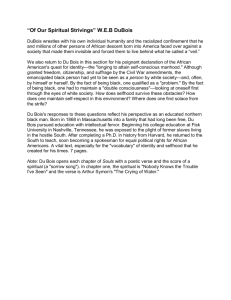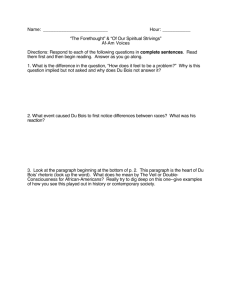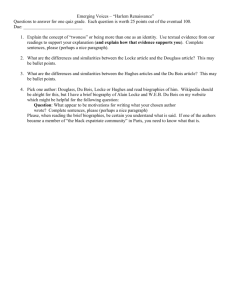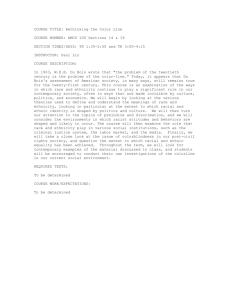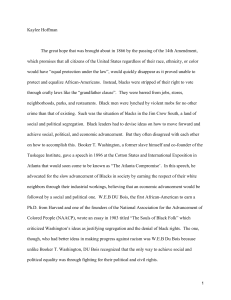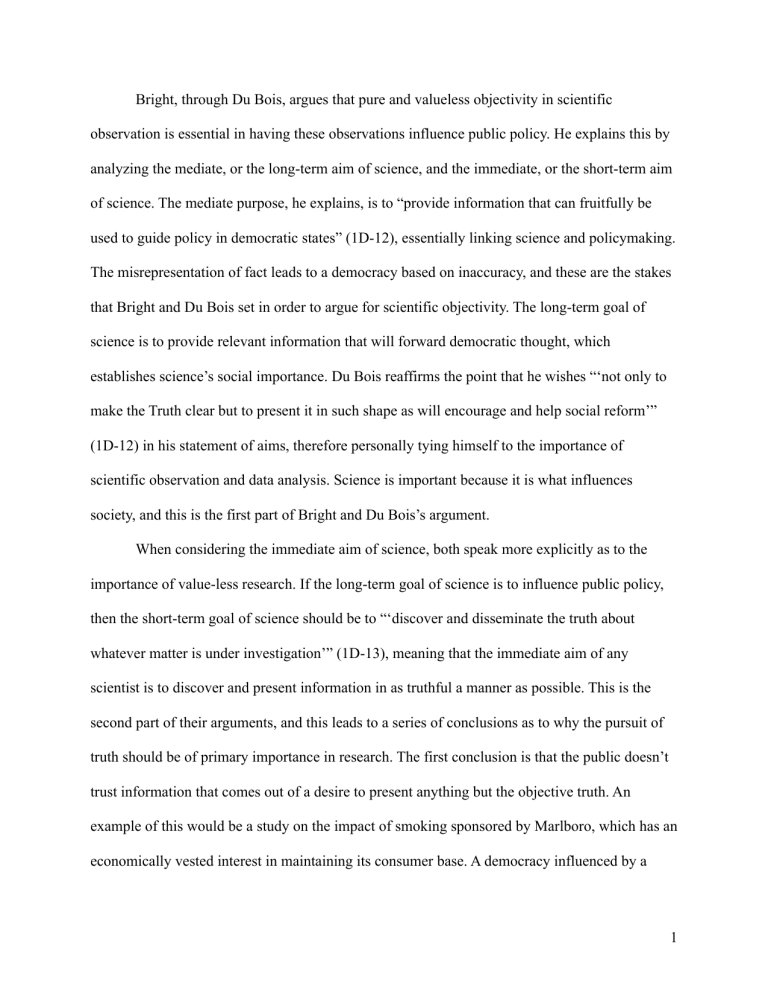
Bright, through Du Bois, argues that pure and valueless objectivity in scientific observation is essential in having these observations influence public policy. He explains this by analyzing the mediate, or the long-term aim of science, and the immediate, or the short-term aim of science. The mediate purpose, he explains, is to “provide information that can fruitfully be used to guide policy in democratic states” (1D-12), essentially linking science and policymaking. The misrepresentation of fact leads to a democracy based on inaccuracy, and these are the stakes that Bright and Du Bois set in order to argue for scientific objectivity. The long-term goal of science is to provide relevant information that will forward democratic thought, which establishes science’s social importance. Du Bois reaffirms the point that he wishes “‘not only to make the Truth clear but to present it in such shape as will encourage and help social reform’” (1D-12) in his statement of aims, therefore personally tying himself to the importance of scientific observation and data analysis. Science is important because it is what influences society, and this is the first part of Bright and Du Bois’s argument. When considering the immediate aim of science, both speak more explicitly as to the importance of value-less research. If the long-term goal of science is to influence public policy, then the short-term goal of science should be to “‘discover and disseminate the truth about whatever matter is under investigation’” (1D-13), meaning that the immediate aim of any scientist is to discover and present information in as truthful a manner as possible. This is the second part of their arguments, and this leads to a series of conclusions as to why the pursuit of truth should be of primary importance in research. The first conclusion is that the public doesn’t trust information that comes out of a desire to present anything but the objective truth. An example of this would be a study on the impact of smoking sponsored by Marlboro, which has an economically vested interest in maintaining its consumer base. A democracy influenced by a 1 study like this is in danger of becoming a democracy subject to the will of its corporations, and the public will question the legitimacy of the research; therefore questioning the legitimacy of the democracy. In other words, scientific accuracy and objectivity through the unbiased collection of data should be what guides the policies a democracy is based upon. A further part of the Du Bois-Bright arguments is that research conducted by ‘non-pure truth-seeking scientists’ tends to include more false data, fraudulent reportings, and the omission of fact to support a point. This perverts scientific research into propaganda, and he uses the example of the misinformation surrounding the history of the Civil War and the Reconstruction era in the United States being the result of “scholars who sought things besides the discovery and dissemination of the truth” (1D-12). Du Bois’s argument here is that there is no positive effect of withholding scientific information, as this falsely influences policy, resulting in the implementation of laws that misrepresent the groups that the data was reporting on. Tying all this to his perspective of Black social mobility, he believes that the social and economic prosperity of the Black community has been stunted through the misrepresentation of policies influenced by data released with the intention to pacify; therefore, causing the men who enact these laws to gloss over these issues. This, in turn, causes skepticism and a distrust of entific analyses “carried out for non-truth seeking means” (1D-14). Not only is this dangerous for the population, it also poses a danger to scientists as it leads them to conduct lousy research. These two elements are the arguments that Du Bois and Bright present to support the conclusion that the immediate aim of research should be objectivity. What I find particularly interesting about Bright/Du Bois’s point is that it can work for his cause as easily as it can work against it. Du Bois believed in Black excellence, and wanted to ensure the socioeconomic progress of the African American population, with him believing that 2 biases in scientific research have led to bad policy making concerning Black Americans. I agree with him on this point, with phrenology being an example of an implicit bias within research influencing the way the studies were conducted and the data that was eventually released. To demean the value of minority races through arguing that there were differences in skull structures and sizes was racist, and as a result, the research involved cherrypicked examples to justify the continuation of slavery in the early 1800s in the face of stronger moral arguments against it. The issue comes when research is conducted with the intent to prove that racial disparity exists in areas of society that hadn’t been identified as racist before. This bias is one that can lead to a subjective analysis of scientific data and the omission of detail, but it would be one that would support Du Bois’s perspective. To admit that the short term goal of science is objectivity means that he opens himself up to being proven wrong and having vulnerabilities in his own research be exposed, sacrificing his own pride in the name of unbiased research. This line of thinking has led me to question the purpose of a hypothesis, since the testing of a question is researching implicit biases. To come up with a hypothesis, one must question the environment around them and draw connections that haven’t previously been observed. Would these questions not be biases? A subjective view of the world that the scientist wishes to prove is actually objective fact? Science wants to prove causality; however, one’s theory must be correlative in nature before causality can be proven. The causal nature of a theory, and the desire to prove this theory, is essentially what Bright and Du Bois argue against, since the desire to prove causality is a bias in research that all scientists have when coming up with a hypothesis. While Bright and Du Bois are correct in believing that the value of research is diminished when personal biases get in the way of objectivity, I don’t believe that this belief is entirely possible. 3
